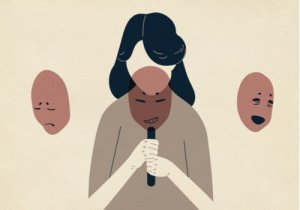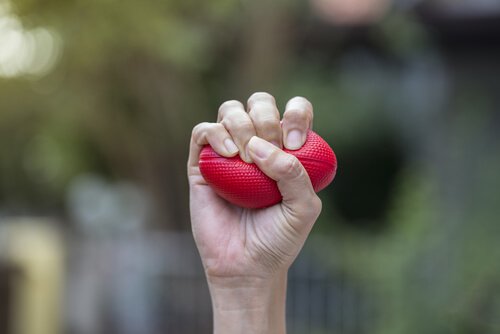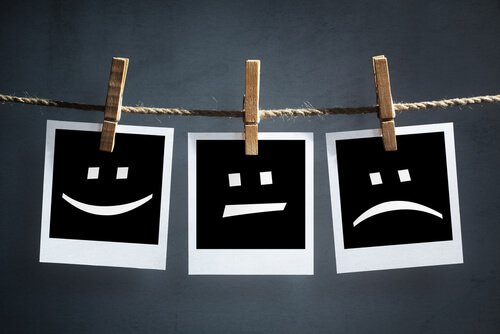Why Masking Your Anxiety Is Bad for You

You’ll go through many things in life that can be stressful. However, dealing with them is helpful and healthy. Although masking your anxiety can seem the best thing to do at first, it can prove harmful in the long run.
When things change, you feel scared and distressed. We’ve all been there. Anxiety is a mental state where you feel insecure and worried. It’s when you only think about what could go wrong. Thus, as you don’t know what to expect, you feel anxious about the future.
Physically, anxiety can make you sweat, bite your nails, pace around, and feel chest pain, among other things. This depends on the situation and how worried you are.
Nevertheless, another response to stress can be masking your anxiety. You can notice this in people who are under great stress but don’t express it. These people act as if nothing’s wrong; their inexpressiveness is just a tool to deal with difficult situations.
“‘Man isn’t worried by real problems so much as by his imagined anxieties about real problems.”
-Epictetus-

Masking Your Anxiety
Everybody expresses emotions in different ways. Some people display the classical signs of anxiety, such as sweating, elevated heart rate, and irritability, but some people are different and express their stress through masked anxiety.
They use inexpressiveness to mask their anxiety. Thus, in difficult circumstances, they act emotionless. Even though they’re anxious, they hide their anxiety. It doesn’t mean they’re heartless, it’s just their way of dealing with stress. The same way some people freeze up during stressful situations, these types of people don’t.
People who mask their anxiety seem emotionless. This is a facade to handle stress and avoid people from asking them awkward questions.
Are these people stronger than most? Maybe, maybe not. They’re just hiding their emotions to avoid being pestered by others. Although they might feel miserable, they won’t discuss it with others.
What Makes You Mask Your Anxiety?
Knowing you’re anxious can be even more stressful. Anxiety isn’t always bad, as it helps you stay alert in dangerous situations. So, it depends on the situation and how you decide to deal with it. What makes you mask your anxiety?
- Being under extreme stress. When people around you don’t know how to handle the situation and you feel compelled to take charge. For example, taking care of funeral arrangements for a loved one.
- Not wanting to show your pain. This can be even more painful. Sometimes you feel people won’t understand what you’re going through.
- Freezing up. When you’re so scared you can’t move nor think.
- An excuse. You don’t want to deal with a seemingly complicated situation.
- Being painfully private. You don’t want anyone to know what’s happening to you, so you outcast yourself.
Although some people only use these strategies sometimes, other people always react this way. You might think they’re cold-blooded, but they just want to be left alone.

How to Deal with Someone Who’s Masking Their Anxiety
These people can be difficult to get to know, especially if you think they’re insensitive. That isn’t always the case, as some people have less trouble expressing their thoughts than others. That’s just the way they are.
When you’re dealing with someone who’s masking their anxiety, try to understand why they’re having a hard time expressing themselves. Don’t judge them. You should help them be confident in themselves so they’ll eventually talk about their feelings.
Sometimes people who mask their anxiety can be scared of being hurt again. That’s when you need to reassure them, make them feel valued again. This is a way to show respect.
Bear in mind that not every inexpressive person is good. Some people don’t have feelings or emotions because they lack empathy.
Benefits of Unmasking Your Anxiety
There are moments in life where you have to think straight and leave your feelings at the door. Nevertheless, unmasking your anxiety has certain benefits, such as:
- It leads to experiencing more authentic relationships.
- Stress relief.
- It leads to increased empathy.
- It boosts self-knowledge.
- Higher self-esteem.
- More honesty.
- Increased tranquility.
- Higher capacity for trusting others.

In itself, anxiety isn’t good or bad, you decide what to make of it. Face your anxiety by unmasking it. You’ll find a way to prove to others and to yourself who you really are.
Being emotionless doesn’t mean being strong; it’s fine if you can’t handle a situation. It’s ok to feel sad, helpless or not knowing what to do. Allow yourself to express your deepest feelings and let others help you. You don’t have to deal with the burden by yourself. Live in the now.
You’ll go through many things in life that can be stressful. However, dealing with them is helpful and healthy. Although masking your anxiety can seem the best thing to do at first, it can prove harmful in the long run.
When things change, you feel scared and distressed. We’ve all been there. Anxiety is a mental state where you feel insecure and worried. It’s when you only think about what could go wrong. Thus, as you don’t know what to expect, you feel anxious about the future.
Physically, anxiety can make you sweat, bite your nails, pace around, and feel chest pain, among other things. This depends on the situation and how worried you are.
Nevertheless, another response to stress can be masking your anxiety. You can notice this in people who are under great stress but don’t express it. These people act as if nothing’s wrong; their inexpressiveness is just a tool to deal with difficult situations.
“‘Man isn’t worried by real problems so much as by his imagined anxieties about real problems.”
-Epictetus-

Masking Your Anxiety
Everybody expresses emotions in different ways. Some people display the classical signs of anxiety, such as sweating, elevated heart rate, and irritability, but some people are different and express their stress through masked anxiety.
They use inexpressiveness to mask their anxiety. Thus, in difficult circumstances, they act emotionless. Even though they’re anxious, they hide their anxiety. It doesn’t mean they’re heartless, it’s just their way of dealing with stress. The same way some people freeze up during stressful situations, these types of people don’t.
People who mask their anxiety seem emotionless. This is a facade to handle stress and avoid people from asking them awkward questions.
Are these people stronger than most? Maybe, maybe not. They’re just hiding their emotions to avoid being pestered by others. Although they might feel miserable, they won’t discuss it with others.
What Makes You Mask Your Anxiety?
Knowing you’re anxious can be even more stressful. Anxiety isn’t always bad, as it helps you stay alert in dangerous situations. So, it depends on the situation and how you decide to deal with it. What makes you mask your anxiety?
- Being under extreme stress. When people around you don’t know how to handle the situation and you feel compelled to take charge. For example, taking care of funeral arrangements for a loved one.
- Not wanting to show your pain. This can be even more painful. Sometimes you feel people won’t understand what you’re going through.
- Freezing up. When you’re so scared you can’t move nor think.
- An excuse. You don’t want to deal with a seemingly complicated situation.
- Being painfully private. You don’t want anyone to know what’s happening to you, so you outcast yourself.
Although some people only use these strategies sometimes, other people always react this way. You might think they’re cold-blooded, but they just want to be left alone.

How to Deal with Someone Who’s Masking Their Anxiety
These people can be difficult to get to know, especially if you think they’re insensitive. That isn’t always the case, as some people have less trouble expressing their thoughts than others. That’s just the way they are.
When you’re dealing with someone who’s masking their anxiety, try to understand why they’re having a hard time expressing themselves. Don’t judge them. You should help them be confident in themselves so they’ll eventually talk about their feelings.
Sometimes people who mask their anxiety can be scared of being hurt again. That’s when you need to reassure them, make them feel valued again. This is a way to show respect.
Bear in mind that not every inexpressive person is good. Some people don’t have feelings or emotions because they lack empathy.
Benefits of Unmasking Your Anxiety
There are moments in life where you have to think straight and leave your feelings at the door. Nevertheless, unmasking your anxiety has certain benefits, such as:
- It leads to experiencing more authentic relationships.
- Stress relief.
- It leads to increased empathy.
- It boosts self-knowledge.
- Higher self-esteem.
- More honesty.
- Increased tranquility.
- Higher capacity for trusting others.

In itself, anxiety isn’t good or bad, you decide what to make of it. Face your anxiety by unmasking it. You’ll find a way to prove to others and to yourself who you really are.
Being emotionless doesn’t mean being strong; it’s fine if you can’t handle a situation. It’s ok to feel sad, helpless or not knowing what to do. Allow yourself to express your deepest feelings and let others help you. You don’t have to deal with the burden by yourself. Live in the now.
This text is provided for informational purposes only and does not replace consultation with a professional. If in doubt, consult your specialist.







